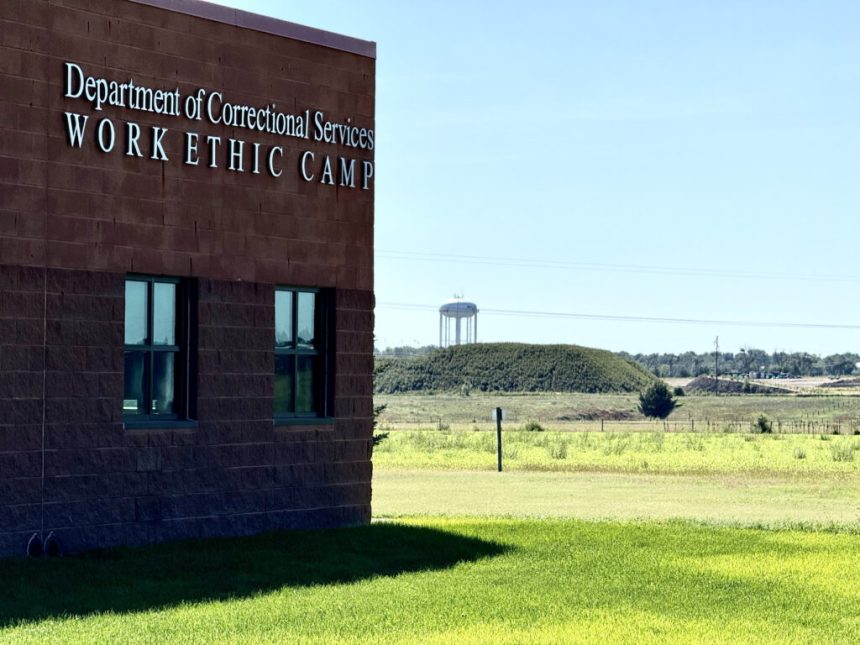The state’s Work Ethic Camp in McCook, Neb., is set to become the “Cornhusker Clink,” the federal name for a detention center for migrants facing deportation proceedings. State Sen. Margo Juarez of Omaha, a vocal opponent, drove more than four hours from her home district to learn more about the facility than has been shared with Democratic lawmakers. (Cindy Gonzalez/Nebraska Examiner)
McCOOK, Neb. — Frustrated by a dearth of information coming her way, a Nebraska lawmaker showed up unannounced this week at the state prison system’s Work Ethic Camp more than four hours from her home district.
State Sen. Margo Juarez of Omaha has been an outspoken critic of Gov. Jim Pillen’s plan to repurpose the state prison in McCook into an ICE detention center, which he announced Aug. 19. The planned prison conversion in this rural community of about 7,200 residents came at the State of Nebraska’s request in response to the Trump administration’s deportation push.
State Sen. Margo Juarez of Omaha arrives at Nebraska’s McCook-based Work Ethic Camp to see first-hand the facility. (Cindy Gonzalez/Nebraska Examiner)
Upon her arrival Wednesday, Juarez was provided a guided tour, which the Examiner was not allowed to join. Afterward, she said she was impressed with the grounds and the prison property’s current use: preparing low-risk inmates with programming to ease their reentry into society.
However, she shared concerns. Among them: worries about crowded conditions — both for a future migrant population and for the broader state prison system that will likely absorb the 186 Nebraska inmates being relocated to other prison facilities from a rehabilitative setting in southwest Nebraska.
“There is no way that I believe 300 people could be housed in that McCook facility,” she said, noting that an area of the prison currently used for teaching appeared to be one of the likeliest spaces for expanding bed space. “I can just see them squeezing these double bunk beds into these rooms.”
Midwest hub for ICE
Pillen has said up to 300 migrants awaiting deportation are to be housed in the repurposed center, which the state will run in partnership with the U.S. Department of Homeland Security’s Immigration and Customs Enforcement. The governor has said he envisions the facility as a Midwestern hub for ICE.
As of Thursday, the Work Ethic Camp had 155 of its 186 state inmates left to relocate. State senators have said the McCook facility, which opened in 2001, was originally designed for 100.
On Thursday, a spokesperson for the Nebraska Department of Correctional Services said the state anticipates that the McCook facility will begin housing its new population of migrant federal detainees in October.
After talking with current Work Ethic Camp inmates about their circumstances, Juarez said she wants the state to consider early release rather than relocation for incarcerated people within a year of completing their criminal sentences.
“To me this circumstance is so unique,” Juarez said. “I’m advocating for as many people to be released as possible. If there are men there that are ready to be let go, I think they should be able to go home.”

McCook, with a population of about 7,200, is about to host ICE’s Midwestern hub for migrant detainees. State officials say the repurposed Work Ethic Camp will start housing federal detainees awaiting deportation in October. (Cindy Gonzalez/Nebraska Examiner)
Juarez discussed her interaction with one McCook inmate, who told her he had six months until his scheduled release and had earned a spot helping in the prison’s kitchen, where he said he was picking up cooking skills. He told her he was anxious that he could be transferred to a facility with fewer privileges.
Said Juarez: “What kind of setback are these guys going to be enduring when they get moved?”
A prison system spokesperson, in response, said the department does not have the authority to release individuals early. (That’s up to the Parole Board.)
Spokesperson Dayne Urbanovsky said all Correctional Services facilities have a “robust offering” of rehabilitative services.
“As much as possible, NDCS will work to ensure individuals who have started programs at WEC can finish those at other facilities,” she said in a written response.
Furthermore, Correctional Services is partnering with an engineering firm to “safely repurpose (McCook’s) multi-purpose spaces to accommodate additional beds,” Urbanovsky said.
Closed-door briefing
Juarez is not the only state senator to have recently visited the McCook facility. Two members of the Legislature’s Judiciary Committee, State Sens. Carolyn Bosn of Lincoln and Wendy DeBoer of Bennington, stopped in earlier this month.
A day after their visit, the Judiciary Committee held a closed-door meeting with certain state officials. The briefing about the conversion plan was organized by Pillen’s Office and Bosn.
DeBoer, a Democrat in the officially nonpartisan Legislature, did not sign a letter from 13 progressive state senators , including Juarez, requesting a public hearing about the McCook project before the Judiciary Committee.
After Bosn said the request for such a meeting was premature, State Sen. Terrell McKinney of Omaha, who also signed the letter, announced that the legislative committee he chairs, the Urban Affairs Committee, would hold a public hearing Friday for people to air opinions. That meeting begins at 9 a.m. in room 1507 of the State Capitol.
The Urban Affairs Committee oversees building codes issues, and McKinney said he is concerned about overcrowding.
Juarez, a Democrat in her first year as a state lawmaker for South Omaha, said she’s felt frustrated and still wants more details about the McCook-ICE project. She said her visit to the facility better prepares her for future conversations.

McCook Mayor Linda Taylor speaks during a press conference with Nebraska Gov. Jim Pillen at McCook’s Ben Nelson Regional Airport on Tuesday. (Brigham Larington/McCook Gazette)
“The only reason that I found out as much as I did was because I physically went down there,” she said.
Juarez said it was her understanding that state law, in addition to giving Nebraska state senators access to prisons without prior notice, allows lawmakers to take phones inside to take photographs and videos. She said she was asked to leave hers in a locker.
While her goal is to squash the use of a state prison as a federal immigration detention center, she said she also learned how she might help future migrant detainees. For example, she said Work Ethic Camp staff pointed out the current library book selection is written in English.
Juarez said she could assist in gathering reading material in different languages. She said she also wants to know if the proposed ICE detention center would continue to offer, as do state prisons, mental and other health care services.
No signed agreement yet
State officials have acknowledged that many details about the facility have yet to be ironed out. As of Thursday, there still was no signed agreement between ICE and Nebraska’s Department of Correctional Services for the detention center federal officials nicknamed “the Cornhusker Clink.”
Among lawmaker questions is whether the executive branch, Pillen’s administration, has authority to let the feds use the state prison facility. Since 1875, the Nebraska Constitution has given the Legislature exclusive authority in the oversight of “general management, control and government of all state charitable, mental reformatory and penal institutions.”
Pillen, however, has cited an article in the Nebraska Constitution saying that “supreme executive power rests with the governor.” He also argues state statute gives him authority through its creation of the Department of Correctional Services.
From the start, Pillen has said he felt a responsibility to support the president’s immigration agenda and wanted Nebraska to do its “fair share.” He has said that he and other Republican governors have heard President Donald Trump’s call to “step up” — and that he was proud to also empower the state’s Nebraska National Guard and Nebraska State Patrol to become a part of Trump’s mass deportation mission.
Many Republican state senators in the officially nonpartisan Legislature also have expressed support for the governor’s position on immigration.
A University of Nebraska-Lincoln law professor who studies the impact of detention said the project offers “spectacle, not safety or stability.” Danielle Jefferis, in an opinion piece Thursday in the Nebraska Examiner, said the Nebraska prison system has traditionally argued that “rehabilitation matters” but that the state is all but eliminating a rehabilitative facility and replacing it with detention beds.
“That choice is not only about corrections policy,” she wrote. “It is about what Nebraska’s leaders value, how the state defines itself and how much control it is willing to cede to the whims of Washington.”
Skeptical
In an interview with the Examiner Wednesday outside of the Work Ethic Camp, Juarez said she was less anxious about what might be ahead for ICE detainees after she saw the prison’s grounds, including an outdoor recreational courtyard.

State Sen. Margo Juarez of Omaha drops off pro-immigrant signs to local residents during her visit to McCook, Neb. (Cindy Gonzalez/Nebraska Examiner)
“I felt a little more calm than I had anticipated once I was inside,” she said.
But she said she was unclear and remained skeptical about how operations might change under an ICE contract and said her visit would be the first of more. Her underlying feeling, she said, is that migrants working in the U.S. without a criminal or violent past shouldn’t be held behind bars.
After her tour of the work camp, Juarez dropped off some “We are Friends of Immigrants” signs to local residents who had requested them from an Omaha group that has protested the ICE facility. Juarez told McCook residents that she planned to continue to monitor the changes.
“I’ll be coming back,” she said.
SUBSCRIBE: GET THE MORNING HEADLINES DELIVERED TO YOUR INBOX









